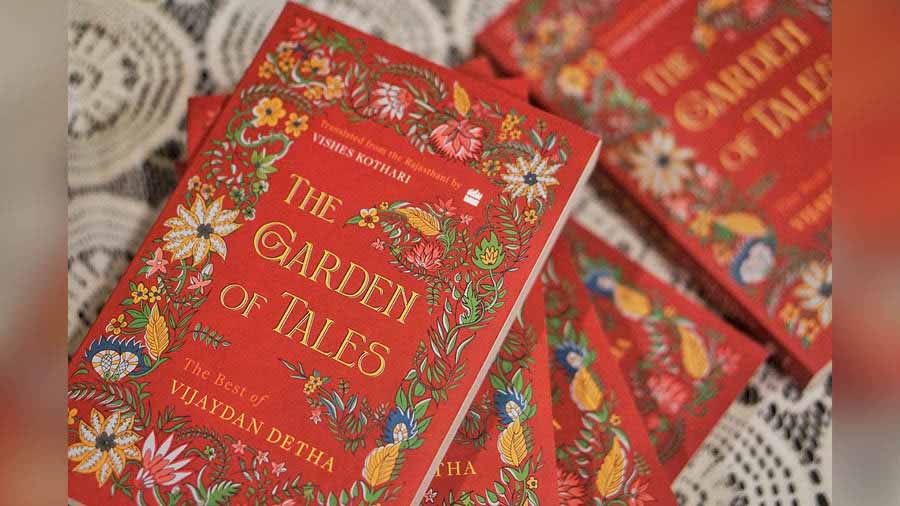A desire to return to indigenous languages and ancient stories is what drove Vishes Kothari to translate Rajasthani tales and folklore into English. The Garden of Tales: The Best of Vijaydan Detha, Kothari’s second book, was launched at the Alka Jalan Foundation in Ballygunge, on April 6.
Before the book launch, Kothari walked My Kolkata through the landscape of Rajasthan that is beautifully captured in litterateur Detha’s works, its language and legends, the scent of its soil and the poetry of its people.
“A translation has its umbilical cord attached to the original work,” Kothari said, “and I try to maintain fidelity by trying to remain the closest to the original language.” He admitted it was inevitable to lose something in the process of translating, but translators use their techniques to construct the cultural setting in a new language.
Kothari’s books are a manifestation of his quest to present the wealth of Rajasthan’s cultural and literary traditions before a bigger audience. He believes there will always be people who will go back to the originals for “translations can never overshadow them”.
Persuaded to pick a favourite from his translated collection of 18 stories, Kothari said, “It is difficult to pick a favourite. If I had to choose one, it would be Jaarav Masi’s Tales because it takes me back to a part of my childhood that I have lost.”
Going back to the roots
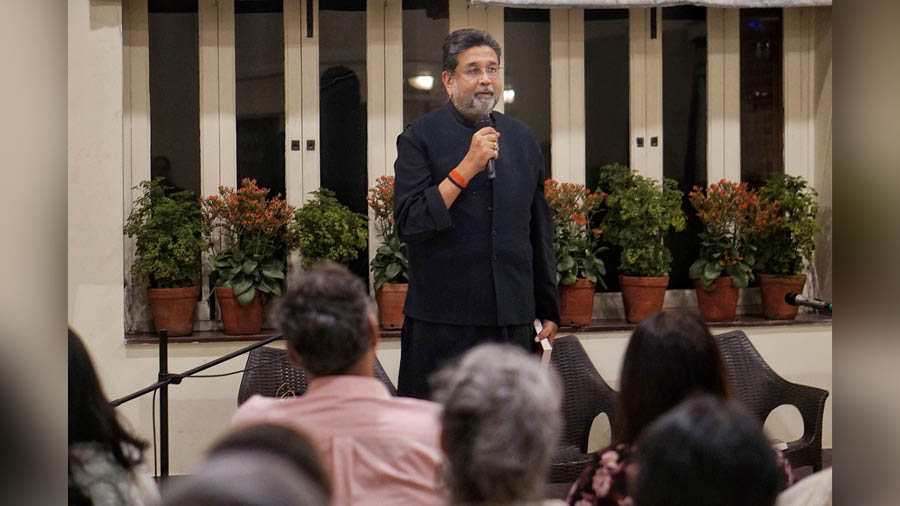
Chief guest Harsh Neotia was reminded of his grandmother, upon reading the book
Harsh Neotia, the chief guest at the book launch, shared memories of his grandmother speaking Marwari. His relationship with the language was severed after her death. He was able to relive a part of his childhood through Kothari’s translation of Detha’s works. He praised the translator for his enterprise in “bring(ing) to life a slice of Rajasthan and the simplicity of its people whose lives are intricately tied to their roots”.
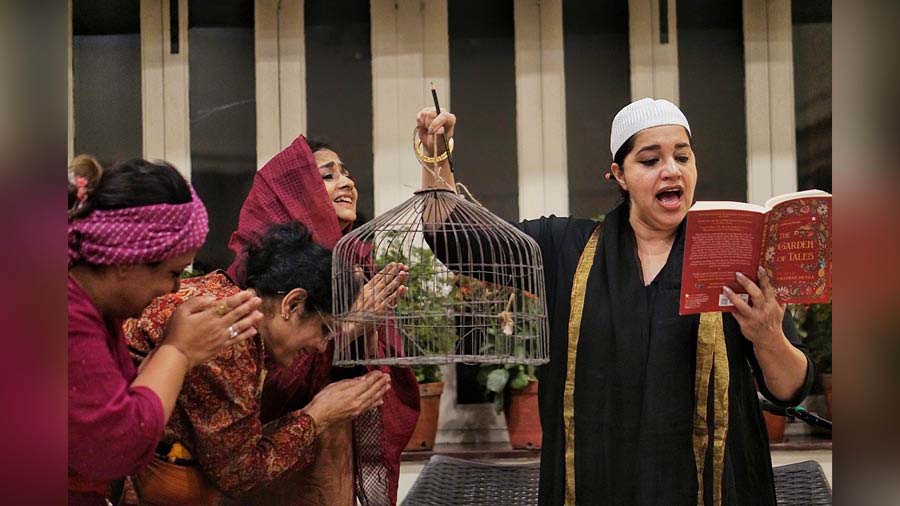
Ramanjit Kaur and her group delivered a lively rendition of the story 'Power'
As a prelude to the discussion around the book, Ramanjit Kaur, the award-winning actor, director and founder of The Creative Arts Academy, transported the audience to the world of the Kaji in a village in Rajasthan through her brilliant rendition of one of the stories from the book – Power. The audience was given a glimpse of the aural, oral and visual elements of Rajasthan’s storytelling tradition. The wry humour accentuated the nuances and complexities of power relations in society, highlighting the universality of Detha’s storytelling.
‘Magical, strange, unusual, funny and powerful’
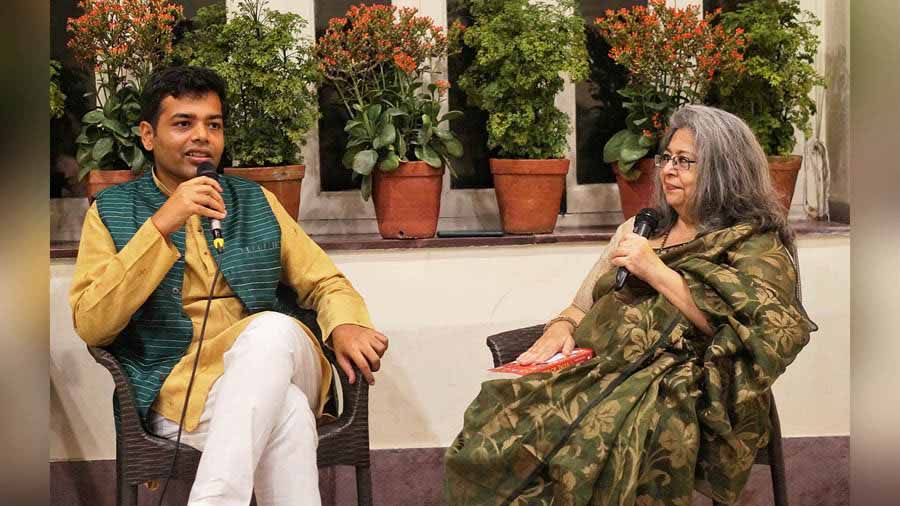
Vishes Kothari in conversation with Anjum Katyal at the book launch
The book was launched by author and editor, Anjum Katyal, who described the assortment of stories as “magical, strange, unusual, funny and powerful”. Detha, fondly known by his sobriquet Bijji, was a contender for the Nobel Prize in Literature in 2011. “I was blown away by the sheer complexity and nuances in Detha’s stories that you [Kothari] have translated. These layered tales are full of paradoxes. The stories are thought-provoking because the characters are never divided into the black-and-white binary,” Katyal said.
Kothari, financial consultant by profession and translator by passion, is committed to delving into and preserving the aural and oral traditions of Rajasthani literature. For the multilingual audience at the event, the author chronicled his journey as a translator in both English and Rajasthani. “Rajasthanis have been migrating to Kolkata for almost two hundred years, but their identity is still conflated with certain disparaging stereotypes,” mentioned Kothari.
On being asked how he picked the stories for his collection, Kothari read and reread Bataan Ri Phulwari, a 14-volume collection of tales that draw on folklore and stories collated from women, shamans, itinerant sages and others. Almost all of Detha’s central characters are women, children or animals. “Folklores are a site of subversion,” expounded Kothari, “because common people resist hegemonic narratives and reverse the power equations through these.”
‘Same-sex Love in India’ mentions Detha’s works
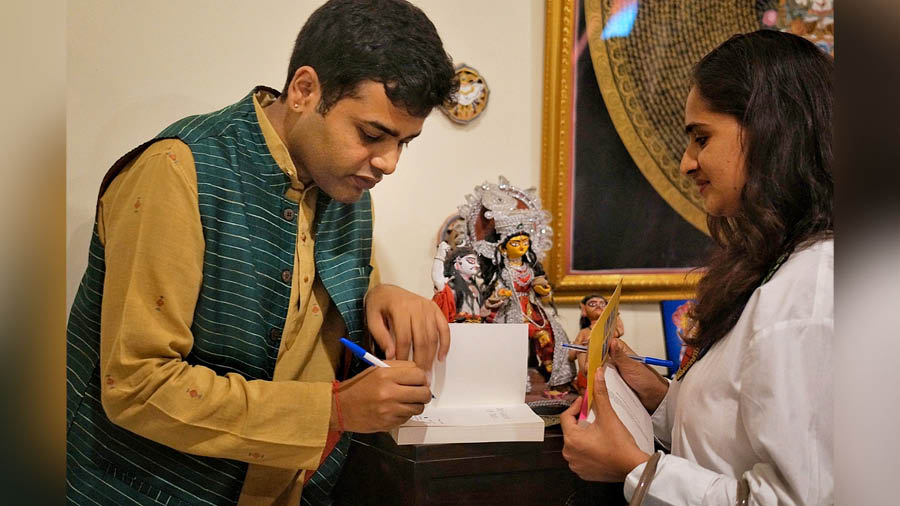
The author signs books for his readers. ‘The literature of the West divorces us from the reality of our lands. Regional literature, on the other hand, anchors us to our soil,’ he said
“We associate people in the progressive and liberal mindscapes with urban life. It is as if the cultural influence of the West can only unfetter our minds,” said Kothari, drawing the audience’s attention to how astute and liberated men and women are in Detha’s universe. While parents in cities are grappling with how to impart sex education to their children, Bijji wrote explicitly about this in his stories for children. Kothari highlighted that the socio-cultural context of literature is an important factor to reckon with. As the children Detha wrote for mostly got married by their early teens, there was a need to educate them about consummating a marriage. Bijji was way ahead of his time with his portrayal of sexuality, women’s desires and deconstruction of stereotypes.
Same-sex Love in India: A Literary History, a landmark work referred to by the Supreme Court’s landmark decision in 2018 to overturn Section 377 and earlier the Delhi High Court’s judgement on the same, mentioned Detha’s works.
‘I grew up on doses of Enid Blyton and Roald Dahl…’
While discussing parochialism and the human limitation to accommodate multiple voices, Kothari was asked about a possible way to integrate regional literature into the school curriculum. “I grew up on doses of Enid Blyton and Roald Dahl. I used to drive my mother crazy, asking her to bake me a cake on Saturdays or make scones and jam. I was fascinated by primroses, though I never knew what they were because I am talking of a pre-internet era. The literature of the West divorces us from the reality of our lands. Regional literature, on the other hand, anchors us to our soil,” he recalled. Kothari concluded the evening by reading out a story in Marwari.
